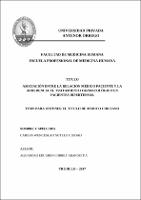Mostrar el registro sencillo del ítem
Asociación entre la relación médico paciente y la adherencia al tratamiento farmacológico en pacientes hipertensos
| dc.contributor.advisor | Correa Arangoitia, Alejandro Eduardo | |
| dc.contributor.author | Sotelo Ciudad, Carlos Wenceslao | |
| dc.creator | Sotelo Ciudad, Carlos Wenceslao | |
| dc.date.accessioned | 2018-04-10T16:40:14Z | |
| dc.date.available | 2018-04-10T16:40:14Z | |
| dc.date.issued | 2018 | |
| dc.identifier.uri | https://hdl.handle.net/20.500.12759/3931 | |
| dc.description.abstract | OBJETIVO: Determinar si existe asociación entre la relación médico paciente deficiente y la no adherencia al tratamiento farmacológico en pacientes con hipertensión arterial en el Hospital de Especialidades Básicas La Noria, en Trujillo en el año 2016. MATERIAL Y MÉTODO: Se realizó un estudio observacional, de casos y controles en 172 casos y 172 controles RESULTADOS: el porcentaje de la deficiente relación médico paciente, en personas que no tuvieron adherencia al tratamiento farmacológico fue 14.5%, cifra mayor que los individuos que tuvieron adherencia al tratamiento, cuyo porcentaje fue 7%, con diferencias estadísticas significativas (p= 0.018). La mala relación incrementa en casi dos veces la probabilidad de no adherencia al tratamiento farmacológico antihipertensivo con un OR= 2.26 con un IC95% de 1.10 a 4.68. CONCLUSIONES: Comparativamente la frecuencia porcentual de la mala relación médico paciente es superior en pacientes sin adherencia al tratamiento farmacológico que en pacientes adherentes a dicho tratamiento. La mala relación médico paciente se asocia con la no adherencia al tratamiento farmacológico como factor de riesgo. | es_PE |
| dc.description.abstract | THE AIM: Determine if there is association between the relationship medical patient deficient and non-adherence to drug treatment in patients with hypertension in Specialties Basic La Noria Hospital, in Trujillo in 2016. MATERIAL AND METHOD: An observational study of cases and controls, was conducted in 172 cases and 172 controls RESULTS: the percentage of the poor patient physician relationship, in people who had no adherence to drug treatment was 14.5%, a figure greater than individuals who had adherence to treatment, whose percentage was 7%, with significant statistical differences (p = 0.018). The bad relationship increases at nearly twice the likelihood of nonadherence to the pharmacological antihypertensive therapy with an OR = 2.26 with a 95% from 1.10 to 4.68. CONCLUSIONS: Comparatively bad patient medical relation percentage frequency is higher in patients without adherence to pharmacological treatment that patient’s adherents said treatment. The poor doctor patient relationship is associated with non-adherence to drug treatment as a risk factor. | en_US |
| dc.description.uri | Tesis | es_PE |
| dc.format | application/pdf | es_PE |
| dc.language.iso | spa | es_PE |
| dc.publisher | Universidad Privada Antenor Orrego - UPAO | es_PE |
| dc.relation.ispartofseries | T_MED.HUMA_2304 | |
| dc.rights | info:eu-repo/semantics/openAccess | es_PE |
| dc.source | Universidad Privada Antenor Orrego | es_PE |
| dc.source | Repositorio Institucional - UPAO | es_PE |
| dc.subject | Relación médico paciente | es_PE |
| dc.subject | Adherencia al tratamiento farmacológico | es_PE |
| dc.title | Asociación entre la relación médico paciente y la adherencia al tratamiento farmacológico en pacientes hipertensos | es_PE |
| dc.type | info:eu-repo/semantics/bachelorThesis | es_PE |
| thesis.degree.level | Título Profesional | es_PE |
| thesis.degree.grantor | Universidad Privada Antenor Orrego. Facultad de Medicina Humana | es_PE |
| thesis.degree.name | Médico Cirujano | es_PE |
| thesis.degree.discipline | Medicina Humana | es_PE |
Ficheros en el ítem
Este ítem aparece en la(s) siguiente(s) colección(es)
-
Medicina Humana [2739]

